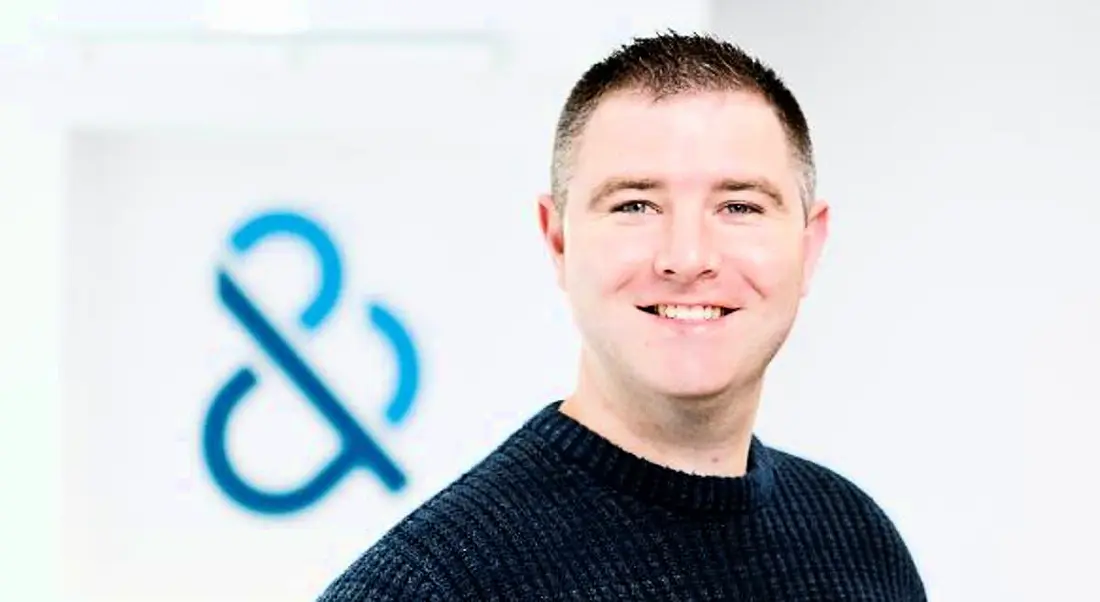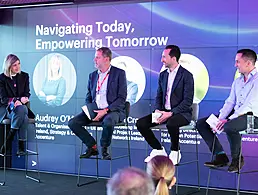As Dun & Bradstreet is currently on the lookout for graduates, senior engineer Dave Hill discusses what makes for a stand-out candidate.
Having experienced the impact of guidance from others throughout his career, Dave Hill is a passionate advocate for mentorship. He says that it’s what helped him move from his position as a quality analysis (QA) engineer to leading a developer-in-test team at Dun & Bradstreet (D&B), where he now focuses on infrastructure automation.
On top of his senior engineering duties, Hill also leads the recruitment campaign for graduates at D&B.
“We try not to focus on hiring a specific number and instead hire the ones we believe are good enough to make a strong impact on the company,” he told Siliconrepublic.com. “That said, 10 would be the maximum we would bring in for any year, for logistical and budgetary reasons.”
‘We actively encourage a sense of fun and global inclusivity – we celebrate everything from Diwali to Fat Thursday’
– DAVE HILL
What do you like most about mentoring?
One of the best ways to learn is to teach. Explaining concepts to others forces you to ensure you are able to understand the key concepts and, inevitably, when there is a question from someone you are mentoring that you do not know the answer to, the collaboration to find the answer is both enlightening for the teacher and encouraging for the student.
While I have always enjoyed learning more about the industry I work in and the technologies we use, the real reward is watching someone grow from a nervous, fresh graduate to an engineer with confidence in their own abilities.
Why is mentoring and collaboration important, especially for people new to a company?
I think everyone would say collaboration is important, regardless of the level of experience. However, it is very common for junior members to feel intimidated and overwhelmed when working alongside more experienced team members. This is something to be tackled as soon as possible as the more people willing to contribute to a discussion, the more ideas tend to be generated and, critically, the earlier problems can be identified.
It’s very much a two-way system – the team benefits from fresh points of view and thorough walkthroughs of the solutions, and the junior team members benefit from having their opinions recognised and their confidence lifted.
What kinds of positions are you hiring for?
We’re focusing mainly on software engineering at the moment but, for the teams you join, that could be focusing primarily on Java, AWS cloud infrastructure or security. We try to take into account people’s preferences when we allocate them to teams so we can support their interests and we’ve successfully placed people on several different career tracks – in QA, development and DevOps.
What are the most important skills and attributes for applicants?
A strong candidate for us has a solid foundation in computer science and experience with any programming language. They are also going to be driven, curious and constantly learning more about the industry. It’s one of the caveats of life in the technology sector that the pace of innovation is constantly speeding up and, as a result, only a genuine interest in the industry will allow individuals to keep abreast of the latest changes and potential benefits of implementing them.
Enthusiasm is probably another very highly valued attribute. We want people to come in and share ideas, volunteer to help and involve themselves with the day-to-day of the company. You’re going to be here full time, so you may as well get involved!
How is D&B’s programme different to other graduate opportunities?
D&B is still learning and adapting its graduate programme. This is only its fifth year and we’re very flexible as we try to maximise the potential of the programme. There is a very dedicated and focused team that supports the programme and its participants and we’re getting even better at streamlining the process from new joiner to active contributor.
And D&B is definitely a company that encourages its staff to learn more, to try new things, to prototype and experiment. It’s a fantastic work environment for people who want to learn more about technology with an incredible family of colleagues, all of whom are always happy to help and share some ideas.
We’ve been very successful with our graduates to date and have kept more than 70pc of the graduates who have gone through the programme, and they have gone on to form the backbone of some of our development teams.
What can graduates expect of the culture at D&B?
D&B is a very exciting place to work. The company is constantly trying to innovate and therefore a large amount of time is spent on identifying new opportunities, experimenting with new technologies and constantly looking to push the boundaries of what our products and software are capable of.
The culture is very much collaborative here. We’ve built up a great mix of people from cultures all over the world and with varying levels of experience, all of which is fantastic for brainstorming as well as keeping the site fun and engaging. We actively encourage a sense of fun and global inclusivity and we celebrate everything from Diwali to Fat Thursday.
Are there training opportunities for graduates at D&B?
We massively encourage learning here at D&B and fully believe that investing in our employees’ education only benefits us as an organisation further. Many of our graduates have gone on to do internationally recognised certificates at industry level. This push towards education never ends and I’ve even taken advantage of this policy to complete my master’s in DevOps as of January 2020.
There is also a great feedback loop where our teams can work with HR and senior levels of management to identify great talent and ensure opportunities for promotions and advancements in their careers.
Internal promotions and hires definitely make up the majority of the roles being filled so there are opportunities to move into more exciting and rewarding roles for those who are focused.
Is there anything important to keep in mind about the application process?
We do get a lot of CVs, so please don’t despair if you haven’t heard within an hour of an interview or submitting a CV. We work extremely hard among the team here on the programme to get back to everyone with useful feedback and results.
Once you get started in the process, we’re looking for potential in the candidates. We don’t expect anyone to come in and solve our biggest problems straight away, but we do want to see that you’ve solved problems in your own areas of expertise.
Also, do not panic when you hear a question you are unsure about or don’t know. If you knew everything, you wouldn’t be a junior engineer!
Do you have any general advice for someone thinking of applying?
A real passion for technology is a key thing for us to identify in our candidates. This illustrates a hunger and curiosity about all things technology. This could be anything from a website you built to host your projects on, to a mobile app you built that plays random ringtones. Ideally these aren’t going to be college projects because you were directed to do them. Instead, what did you do for your interests?
I like to build Alexa skills to dish our chores out to my kids and build modding tools for video games. They are not examples of enterprise-level software development, but they give an example of activities that highlight an authentic interest in technology. People we’ve hired were able to show blockchain implementations, web applications and custom video game levels.
Anything that demonstrates a level of initiative is going to be very good for your application and will stand out more than the people who’ve done four years of college and nothing outside it.




